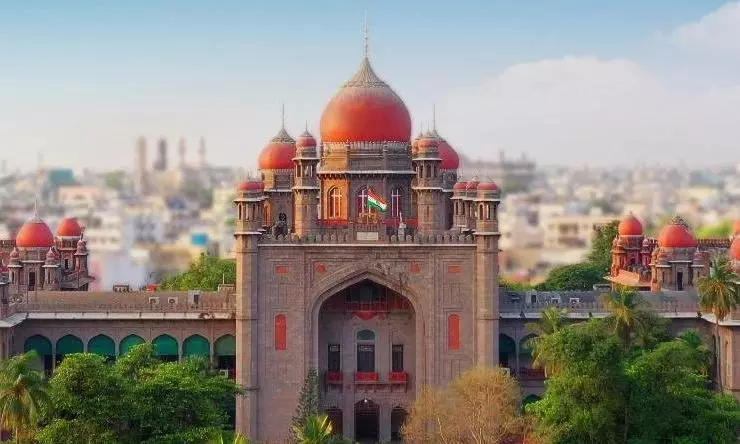Man convicted of rape acquitted
The judge acquitted the accused and ordered a refund of any fines paid by him and set aside the conviction, stating that the prosecution had failed to prove the offence under IPC;

Hyderabad: The Telangana High Court acquitted a man convicted of rape ruling that his relationship with the victim was consensual and had led to marriage. Justice Juvvadi Sridevi was dealing with a criminal revision case filed by Sode Vishnu Narayana Shivaiah. The case dates back to 2008, when the victim, a resident of Khammam district, alleged that the accused sexually assaulted her under threat and later promised marriage. They eventually married in January 2009, but the accused abandoned her, leading to a police complaint. The trial court acquitted him of cheating but convicted him of rape, a decision upheld by the appellate court in 2019. During the hearing, the defence argued that the couple lived together as husband and wife, and the delayed complaint was raising doubts. The judge observed that their marriage was supported by evidence, including witness testimonies and photographs. Citing Supreme Court rulings, the judge held that a consensual relationship cannot later be termed as rape. Since the accused and victim were legally married at the time, the case did not constitute rape under the IPC. The judge acquitted the accused and ordered a refund of any fines paid by him and set aside the conviction, stating that the prosecution had failed to prove the offence under IPC.
Sand desilting tender: HC sets aside single judge order
A two-judge panel of the Telangana High Court on Thursday set aside the order of a single judge that quashed the award of a sand desilting tender in Jayashankar Bhupalpally district. The panel, comprising acting Chief Justice Sujoy Paul and Justice Renuka Yara, upheld the decision of the state government to reject an application of bidder, emphasising strict compliance with tender conditions and transparency in the procurement process. Initially a tender was floated for desilting 15,52,923 metric tonnes (MT) of sand at Beglur/2024/1 sand reach, at an estimated value of Rs.15.06 crore. GKR Infracon India Pvt. Ltd, whose bid was rejected, challenged the decision, alleging arbitrariness and lack of reasons for disqualification. The single judge ruled in its favour, declaring the rejection illegal and ordering fresh bids. The panel, however, found that GKR Infracon India had failed to meet clause 3.2 of the tender conditions, which mandated proof of satisfactory completion of a similar project worth at least Rs.12.05 crore in the last three years. The court noted that the bidder’s work-done certificates clearly indicated that the projects were still "in progress," thereby disqualifying them. The panel also dismissed allegations of mala fides, noting that the successful bidder was selected through a lottery conducted transparently in the presence of all participants. Addressing the contention that no reasons were given for the rejection, the court held that the e-procurement portal’s entry—"clause 3.2 conditions not fulfilled"—sufficed as a reasoned order. It clarified that the "remarks" column, which stated "qualified as per eligibility criteria," only confirmed document submission, not compliance with substantive conditions. The judgment reinforced judicial restraint in contractual matters, citing apex court precedents that limit interference unless mala fides or arbitrariness is proven.
Plea challenges irrigation dept directives: Penganga project
Justice C.V. Bhasker Reddy of the Telangana High Court admitted a writ plea challenging the directives of the irrigation and command area development department, Penganga project division, to resume the work without acquiring the land. The judge was dealing with a writ petition filed by N. Swarna electricals and contractors, contesting the insistence of the department to resume work without acquiring the balance land required for the project and extension of expired bank guarantees. The petitioner contended that they were being compelled to resume work under the agreement entered into in September 2017, despite the non-acquisition of 113.35 acres of land, making the completion of the project unfeasible. The petitioner sought directions for the closure of the contract on an "as is where is" basis, as per the recommendations made in departmental reports in August 2023, and for consideration of their representations, which had not been acted upon by the authorities concerned. The petitioner also challenged the validity of the proceedings issued by the executive engineer, irrigation division, Adilabad, directing Indian Bank to extend expired bank guarantees amounting to over `2 crore. The petitioner argued that the bank guarantees lapsed in March 2024, rendering their extension arbitrary, and sought their return. The judge, after hearing the matter, admitted the writ plea and directed the respondents to file their response.
HC reserves verdict on plea against blacklisting by TMSIDC
Justice Pulla Karthik of the Telangana High Court reserved its verdict in a writ petition against blacklisting of ceftriaxone injection 1gm, by the Telangana Medical Services and Infrastructure Development Corporation Ltd (TMSIDC) for three years. The judge was dealing with a writ plea filed by Sai Parenterals Limited, which contended that the blacklisting order was arbitrary and violated the principles of natural justice. It argued that the corporation acted prematurely as only one batch of the drug was found to be substandard, whereas the tender conditions mandated blacklisting only if three separate batches failed quality tests. Additionally, the petitioner stated that it did not receive a sample of the alleged substandard drug from the drug inspector, which was necessary to file an appeal before the Central Drug Laboratory (CDL). The respondents countered that a statutory authority had tested the drug and declared it as substandard, making it unfit for supply until the findings were overturned. It further argued that their actions were based on regulatory compliance.

